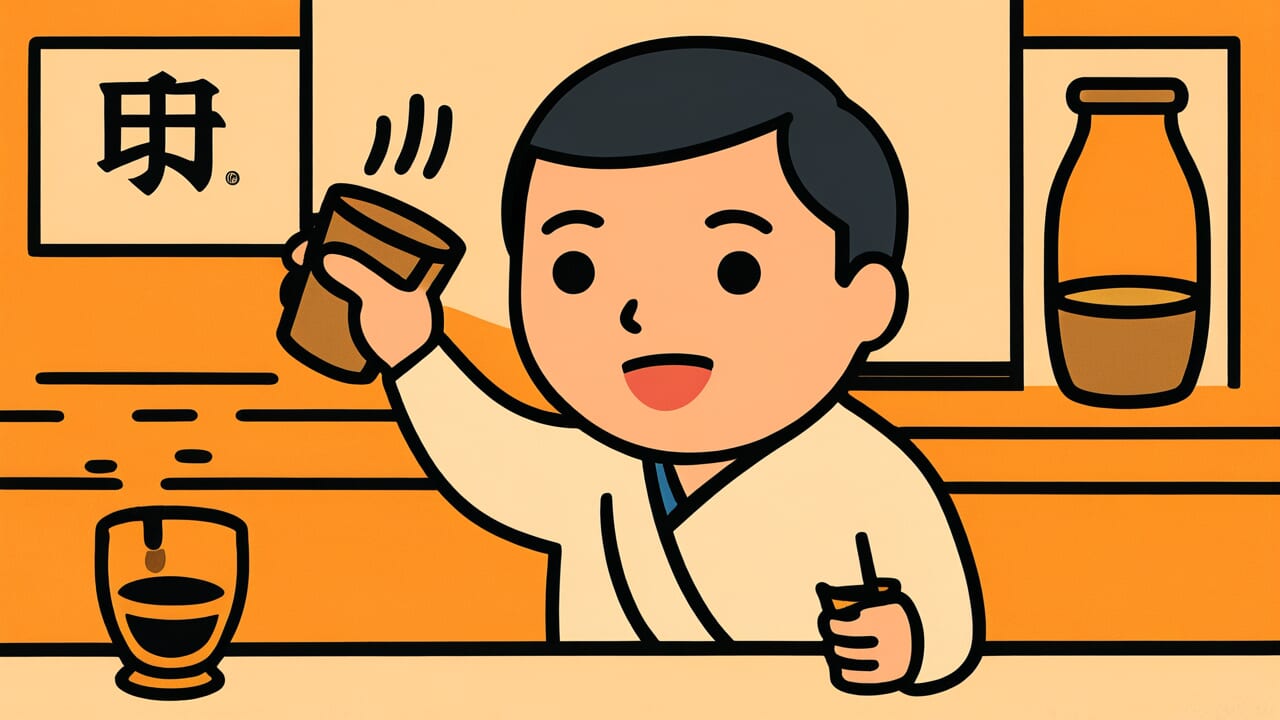How to Read “You won’t get drunk on sake you don’t drink”
のまぬさけにはよわぬ
Meaning of “You won’t get drunk on sake you don’t drink”
“You won’t get drunk on sake you don’t drink” means that if you don’t get involved, you won’t be affected. Just as you won’t get drunk if you don’t drink sake, if you stay away from certain situations or relationships from the start, you won’t get caught up in the problems or troubles that come from them.
This proverb teaches preventive wisdom. It shows that instead of dealing with problems after they happen, you have the option to avoid things that might cause problems in the first place.
It’s used in situations where you should keep your distance, like unnecessary troubles, suspicious offers, or conflicts that don’t concern you.
This wisdom still works today. There are many situations where not getting involved is the best choice, like online arguments, workplace politics, or risky investment schemes.
While taking action is often seen as a virtue, this proverb teaches the importance of wisely keeping your distance.
Origin and Etymology
The exact first appearance of this proverb in literature is unclear. However, based on its structure, it likely came from practical wisdom deeply rooted in Japanese daily life.
The expression “You won’t get drunk on sake you don’t drink” shows an extremely simple cause-and-effect relationship. It seems to state an obvious fact that you won’t get drunk if you don’t drink sake.
But there’s a reason why this became established as a metaphorical proverb.
In the lives of common people during the Edo period, sake was both a symbol of joy and a source of trouble. People witnessed various problems related to sake, like mistakes made while drinking or financial issues caused by alcohol.
From such experiences, the lesson “you won’t be affected if you don’t get involved” came to be expressed using the most familiar material: sake.
The cleverness of this expression lies in how it conveys universal wisdom applicable to all of life while using a concrete example everyone can understand.
It’s a characteristically Japanese indirect way of teaching wisdom about human relationships and avoiding trouble through the everyday subject of sake.
Usage Examples
- That company’s troubles prove “you won’t get drunk on sake you don’t drink”—I was right not to get involved from the start
- Before sticking your nose into the neighbors’ dispute, you should remember “you won’t get drunk on sake you don’t drink”
Universal Wisdom
“You won’t get drunk on sake you don’t drink” teaches us the instinctive wisdom of self-protection that humans possess. We are social creatures who live within various relationships.
However, getting deeply involved in every relationship can sometimes put us in danger.
This proverb has been passed down for so long because humans are fundamentally “easily drawn in.” Curiosity, obligation, pride, sympathy—these emotions are beautiful, but they can also pull us into unnecessary troubles.
When someone is in trouble, we want to help. When an interesting story comes up, we want to get involved. That’s human nature.
That’s exactly why our ancestors left us this simple, clear teaching. You don’t need to get involved in everything. You have the freedom to choose.
Keeping your distance isn’t coldness—it’s wisdom. This wisdom teaches the importance of drawing boundaries to protect your own life.
The choice not to get involved is also a form of courage.
When AI Hears This
In quantum mechanics, a particle’s state isn’t determined until it’s observed. An electron exists in a superposition state at both position A and position B simultaneously, and only when measured does it settle into one or the other.
The structure of this proverb is surprisingly similar to this. In the body of someone who doesn’t drink sake, the state of drunkenness doesn’t “not exist”—rather, it remains “undetermined.”
More precisely, only when the external element of sake and the system of the body interact does the observable result of drunkenness emerge. In quantum mechanics, when the measuring device and particle interact, the wave function collapses and the state becomes determined.
In other words, the act of “drinking” isn’t merely a cause—it’s the observation act itself that converts possibility into reality.
What’s interesting here is that the principle quantum mechanics teaches—”no state change without interaction”—holds true even at the level of everyday cause and effect.
We take for granted that “if there’s a cause, there’s an effect,” but at the quantum level, experiments confirm that “results only emerge when there’s a specific relationship called interaction.”
This proverb expresses this fundamental rule governing the universe in a form everyone can accept. The everyday obvious is actually connected to the deepest depths of physics.
Lessons for Today
What this proverb teaches modern you is the importance of “the courage not to get involved.” Haven’t we convinced ourselves that we must respond to every invitation, stick our noses into every problem, and react to every piece of information?
Arguments flowing through social media, workplace politics, troubles in friendships, suspicious money-making schemes—modern society tempts you with various kinds of “sake.”
But you don’t need to get involved in everything. Discern what’s truly important for your life, and wisely keep your distance from everything else.
That’s not running away—it’s an active choice to protect your time and energy.
What matters is deciding for yourself what to get involved in and what to avoid. Don’t go with the flow—draw boundaries based on your own judgment.
When you become able to make that choice, your life should become more peaceful and more fulfilling.
The choice not to get involved is also a respectable way of living.



Comments